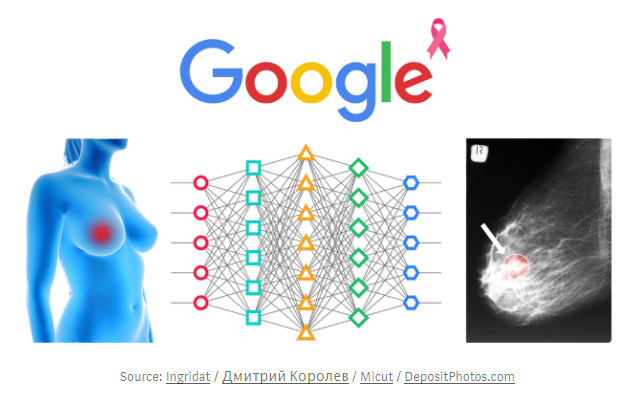

History
A team of researchers from the United Kingdom and the United States recently released details highlighting that Google's artificial intelligence technology is better suited to detecting breast cancer by mammogram screening than human radiologists. The new method will boost care in the future; it removes several frequent errors in the diagnosis of cancer.
The American Cancer Society estimates that radiologists miss about 20% of breast cancers in mammograms due to false negatives and false positives. Mammography has been influential in the screening and diagnosis of breast cancer for decades. Nevertheless, even technical developments over the years have not been able to mitigate the high incidence of error.
The solution appears to be adding AI to the equation.
Here, it should be noted that approximately 80% of cancers missing during mammography are visible but either go unnoticed or are mistakenly considered benign. The above-mentioned international research community has come together to provide a solution to this age-old problem.
Artificial Intelligence and Mammograms — The Research
To test the effectiveness of the AI program in a clinical environment, a large representative dataset from the UK and a large enriched dataset from the USA were analyzed. The program was found to be responsible for an actual decrease of 5.7 per cent and 1.2 per cent in false positives and 9.4 per cent and 2.7 per cent in false negatives (in the USA and the UK, respectively). The researchers independently examined six radiologists, all of whom were outperformed. They concluded, therefore, that the Google program could produce better performance.
Astonishingly, the area under the receiver operating characteristic curve (AUC-ROC) for the mechanism was higher than the AUC-ROC for the average radiologist at an absolute margin of 11,5 per cent. Furthermore, the application of artificial intelligence to the dual-reading process retained a non-inferior output while reducing the workload of the second reader by 88%.

Alphabet's DeepMind AI project, which merged with Google Health in September 2019, was included in the report. Prior to its research work, Alphabet DeepMind has gained a strong track record of creating high-performance AI systems that are adept at consistently outsmarting humans in video games. The first medical use was to support clinicians in the real-time study of anonymized eye scans, which searched for early signs of conditions that could lead to potential blindness in patients.
Matching and Confirming Findings
While discussing the accuracy of the results of the report, Connie Lehman, head of the Massachusetts General Hospital 's breast imaging department, stated that the findings were directly compatible with those of a number of other groups seeking to use AI to enhance the detection of cancer, including those reported in her research. Lehman focused on using a deep learning model to triage a portion of mammograms as cancer-free, enhancing accuracy and workflow capacity. The use of the application showed a possible reduction in the workload of the radiologist and a major increase in the accuracy, without losing any sensitivity whatsoever.
Lehman acknowledged that computer-aided detection (CAD ) systems did not make much of a difference in medical diagnosis. This is because most of the programs have only been trained to identify what a human radiologist can see. AI systems, however, can diagnose cancer more accurately as they ingest and learn from the real outcomes of thousands and thousands of mammograms. As a result, these systems have a greater capacity to recognise signals that the human eye and brain can overlook.
Concluding
AI's been rising amazingly. This also plays a vital role, such as the diagnosis of illnesses and the detection and preparation of personalized care. The results of this research work suggest that AI-systems, if properly engineered and maintained, are more capable of catching cancer than humans. Through the growing use of such AI-based diagnostic systems, more lives will be saved.
This post hits me at home because of my family's breast cancer. I devote this blog post to all the important women who bravely fight or bravely fight breast cancer. I hope that the advancements in this area will come quickly so that we can develop and finally end the tirade.
